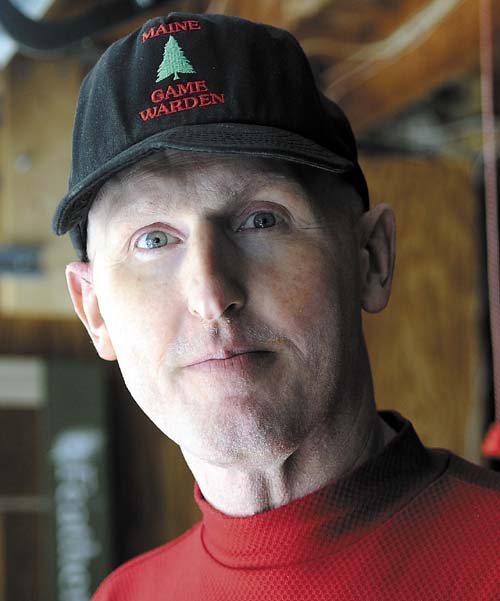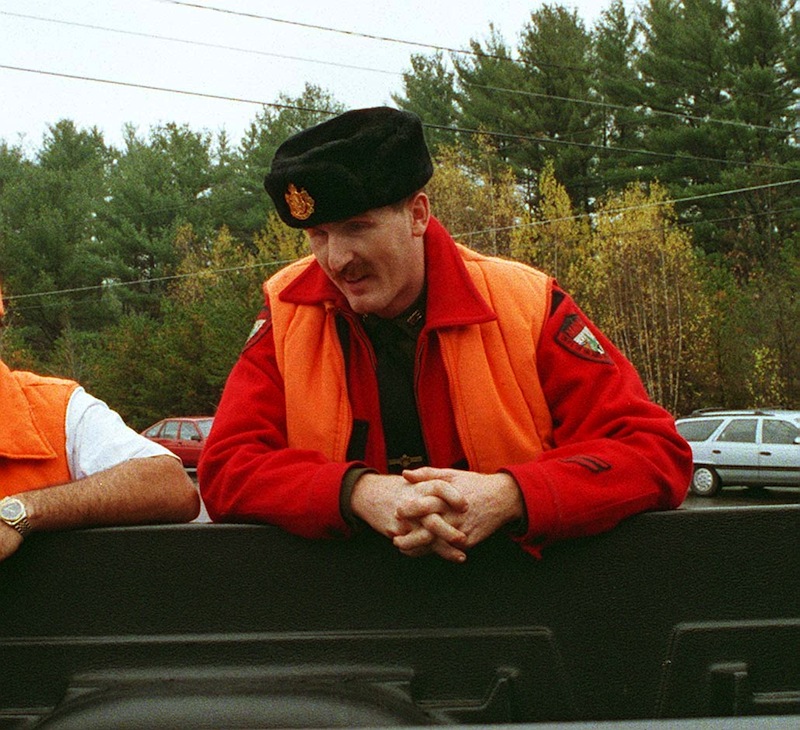VASSALBORO – A crowd of more than 1,000, many of them Maine game wardens and law enforcement officers from across the state, filled the Maine Criminal Justice Academy on Monday to say goodbye to Maj. Gregg Sanborn.
And Sanborn, who touched many lives in Maine during his 23-year career with the Maine Warden Service, said goodbye to them.
In a 20-minute video made near the end of his life, Sanborn told his fellow wardens what working for the service had meant to him, and how much he loved the Maine outdoors.
Sanborn, who rose from field warden to the service’s second-highest rank in the course of his career, died Feb. 6 at age 47 of cutaneous T-cell lymphoma.
Colleagues and friends at his memorial service said he epitomized the Warden Service’s traditions and values.
“Gregg was an ambassador for the service, the department and the people of the state of Maine. He will be missed by anyone who ever knew him,” said Sgt. Ron Dunham, a 16-year warden service veteran.
“He is hands down the toughest man I have ever known. He said it in the video: ‘I lost, but I did not quit,’” said game warden Lt. Adam Gormely.
On Monday, a standing-room crowd heard the story of a warden many said exemplified the hard-working, never-give-up ethic of the service.
“He was still teaching us, right up until the end. But Gregg was a teacher,” said Chandler Woodcock, commissioner of the Department of Inland Fisheries and Wildlife.
Don Kleiner, head of the Maine Professional Guides Association, said Sanborn treated everyone with respect. He was known for his friendly, calm approach on the job.
“I met people he picked up on violations. I talked to a couple of them and they said, ‘I was wrong, but he was very much a gentlemen in the way he made the arrest,’” said Fred Westerberg of Fryeburg, Sanborn’s neighbor growing up.
Sanborn worked nearly everywhere in Maine, from the Sebago region to Aroostook County, Down East and around Millinocket before he was promoted to major and began working at the Augusta office in 2004.
There, he worked to improve the service. Because of state budget cuts, the number of lieutenants in the service had been reduced from five to two, each in charge of half the state’s 125 field wardens. Sanborn lobbied for a return to five lieutenants and five divisions based at different locations to better cover the state.
He also improved the interview process for new wardens and worked to hold applicants to higher standards. And he pushed for arming field wardens with rifles rather than shotguns so they could better protect themselves when dealing with armed poachers.
And he watched out for the wardens in the field.
When Maine Warden Pilot Daryl Gordon’s plane was lost in the line of duty on March 24, 2011, Lt. Tom Ward in Ashland said, Sanborn left immediately from his home in Sidney and drove four hours to the Ashland Warden Service office to help with the search.
“It was the middle of the night and he walked in the door. I couldn’t have been prouder,” Ward said. “It was just a very tough time for everyone, but Gregg was there. I never knew until I saw him then just how much this guy did behind the scenes.”
Sgt. Dunham said this was typical. He remembered Sanborn sleeping on the floors of command posts during several searches for lost children and hunters.
“He would take a blanket and lie down where he was. He was not willing to leave until the search was resolved,” Dunham said.
Sanborn put the good of the Warden Service above his own ambitions, said Col. Joel Wilkinson, warden service commander.
Sanborn was acting colonel of the service in 2008 and had applied for the top job, but Wilkinson was promoted over Sanborn to the post. Sanborn supported Wilkinson and agreed to stay as second in command.
“I met with Gregg and although he probably had some disappointment that he was not selected, he said I had to step up, that it was my job and he was concerned who the Warden Service would get if I didn’t. He became a huge advocate for me taking the role,” Wilkinson said.
“Now when I look back, me as colonel and him as major, they were just titles. We were a team. He was as dedicated to our mission as they come, to our core values. He preached it. He lived it. He loved it,” Wilkinson said.
Dunham said his friend fought cancer with the same ferocity that he applied to his work.
“He was very committed to whatever he was doing. He was committed to win. There are just some battles you can’t win,” Dunham said.
“I saw it right to the very end. I saw him fight just to stand. And then I saw him, finally, resolve that he would soon be passing. He did it very dignified. He definitely was unique. There will never be another like him.”
Staff Writer Deirdre Fleming can be reached at 791-6452 or at:
dfleming@pressherald.com
Send questions/comments to the editors.




